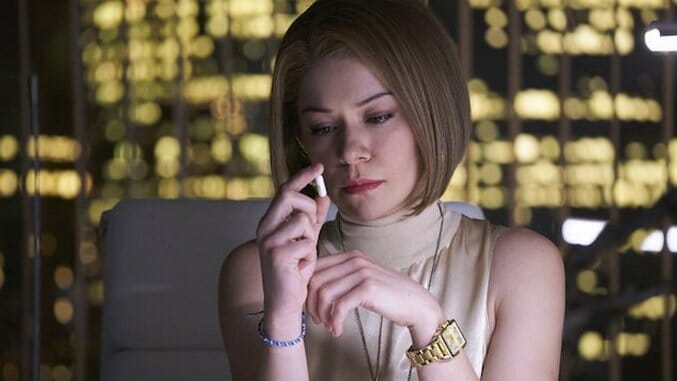Orphan Black Desperately Needs to Focus as It Enters Its Final Stretch
(Episode 5.07)
Photo: Ian Wilson/BBC America
The problem with maintaining Orphan Black’s gigantic stable of characters is that, unless the writers are willing to trust their audience and write intelligent omissions, large chunks of new episodes are rehashes. Everyone has to explain what’s going on to everyone else and the only people that seem to grasp the totality are the viewers, which makes each episode’s opening feel like a conference call you’d rather put on mute. “Gag or Throttle,” which is what I’d like to do to most of these exposition scenes, suffers from the writing team’s refusal to have their characters catch each other up off-screen.
They’re more than willing to do other things behind the scenes, though, as they reveal Ira (Ari Millen)’s grave in the wake of Susan Duncan’s (Rosemary Dunsmore) death and Virginia Coady’s (Kyra Harper) scientific usurpation. Rachel (Tatiana Maslany) is at the root of all these changes, something the matricidal maniac seems to be coming to terms with as she begins escaping the emancipatory thrall of PT Westmorland (Stephen McHattie). She may be free from the company’s ownership (clone economics are terrifying), but she’s still in the dark.
The majority of the clones know that PT McOldMan isn’t really who he says he is, and is riding the lie of longevity as far as it’ll take him. They’ve used this knowledge to sow dissent in Revival, but getting it to the higher-ups is a bit harder. When they send the information along to Rachel, a silly act of subterfuge more than a season in the making unfolds, but the story slinks along so underwhelmingly that it never holds tension. The act they’re trying to prevent never seemed plausible in the series’ fiction: Thwarting it doesn’t feel like a success, but rather an inevitability. You don’t applaud gravity for pulling your ball back down to Earth.
“Gag or Throttle” even manages to do wrong by Donnie (Kristian Bruun) and Alison (Maslany), delivering the latter back into the former’s arms after an unseen mid-life crisis the results of which are far less entertaining than watching their origination. After a perfectly graceful exit from the series, she’s dragged back in with her character completely altered by things that sound much more fun (a Jungian?) than what we’ve been dealing with back in Clone Central.
Orphan Black’s trademarked brand of body horror and broad, soapy plotting barrels through the Maslany-centric episode, reuniting Cosima (Maslany) with her old nerd partner, Scott (Josh Vokey), and letting Sarah (Maslany) and Mrs. S (Maria Doyle Kennedy) stew over information that’s old to everyone but them. Kira (Skyler Wexler, still given impossible-to-deliver lines) sits in the middle, the poor girl completely resigned to being a briefcase full of MacGuffins for the show’s warring sides to fight over.
These sides see a few new characters bubble up, either being more clearly drawn from the vague shadowy organizations to which we’ve been introduced or dragged from the recesses of the show’s history. Another male clone and another Neolution board member are singled out for special treatment, though neither feels at home in a show that should be, in its final stretch, narrowing its focus rather than loosening more ends. These are intercut with Rachel’s history growing up in the heart of Dyad, a story we’ve heard countless times through her parents, her parental surrogates, and the unending video footage shoved on every wall for what seems like a full season. If you’re worrying about whether we get to see that archival clip again while Rachel drains a bottle of booze, you can rest easy. Though intended to resonate with consequence, all this scene made me wonder is if the clones have a genetic predisposition towards alcoholism.
The episode, and series, wanders their circles slowly. Sometimes that pays off in a high-energy climax that makes all the complex politicking worth it. Sometimes, as in “Gag or Throttle,” the arc crumbles after its structure is weakened by the sheer amount of time and content it’s been stretched to cover. With Rachel’s allegiance finally a bit more complex than her heel turn to hardcore evil late last season, a change the show’s been milking for ages, the way is clear for Clone Club to unite and work against their oppressors. More tangible conflict is coming, it’s just too bad we had so much filler in between.
Jacob Oller is a writer and film critic whose writing has appeared in The Guardian, Playboy, Roger Ebert, Film School Rejects, Chicagoist, Vague Visages, and other publications. He lives in Chicago, plays Dungeons and Dragons, and struggles not to kill his two cats daily. You can follow him on Twitter here: @jacoboller.







































